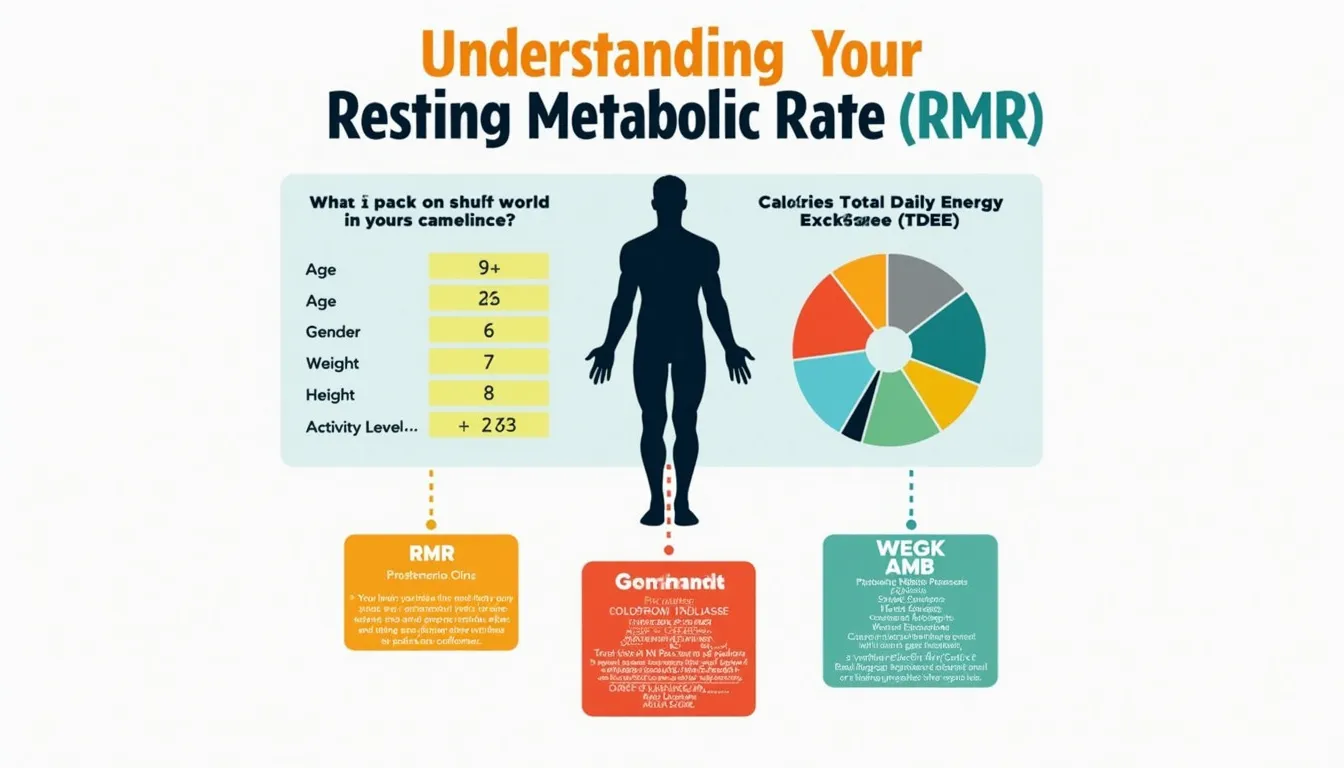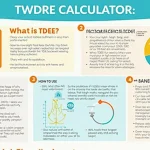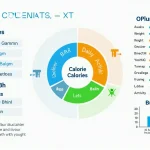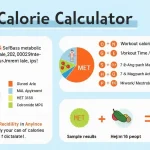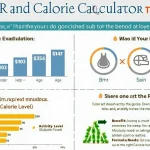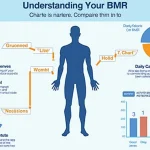RMR Calculator
Is this tool helpful?
How to use the tool
- Age (yrs) – type your exact age, e.g. 26 or 61.
- Gender – choose Male or Female.
- Weight – enter mass and unit, e.g. 80 kg or 165 lb.
- Height – supply stature, e.g. 182 cm or 65 in.
- Activity level – match your week: Light (1-3 sessions) to Extra (hard daily work).
- Body-fat % (optional) – e.g. 18 % or 30 %; enables lean-mass-based math.
Formulas applied
Mifflin-St Jeor (used when body-fat is unknown) (Mifflin et al., 1990):
$$\text{RMR}_{\text{men}} = 10W + 6.25H – 5A + 5$$ $$\text{RMR}_{\text{women}} = 10W + 6.25H – 5A – 161$$Katch-McArdle (used when body-fat is provided) (Katch & McArdle, 1996):
$$\text{RMR}=370+21.6 \times \text{LBM}$$ $$\text{LBM}=W\;(1-\frac{\text{Body-fat \%}}{100})$$Total Daily Energy Expenditure:
$$\text{TDEE}= \text{RMR} \times \text{Activity Factor}$$Worked example 1 (Mifflin-St Jeor)
- Age 26 yrs | Male | 80 kg | 182 cm | Lightly active 1.375
- Weight-loss target: 1 993 kcal
- Maintenance: 2 493 kcal
- Gain: 2 993 kcal
Worked example 2 (Katch-McArdle)
- Age 61 yrs | Female | 165 lb (74.8 kg) | 65 in (165 cm) | Body-fat 30 % | Sedentary 1.2
- Weight-loss: 1 301 kcal
- Maintenance: 1 801 kcal
- Gain: 2 301 kcal
Quick-Facts
- Input range: 15-120 yrs, 30-500 kg, 100-250 cm (WHO Anthropometry Guide 2023).
- Mifflin-St Jeor predicts RMR within ±10 % for 82 % of adults (Frankenfield 2005, J Am Diet Assoc).
- RMR accounts for 60-75 % of daily calorie burn (ACSM Position Stand 2016).
- Katch-McArdle error ≈3 % when body-fat is measured via DXA (Heymsfield 2014, Obesity Rev.).
- Laboratory metabolic cart testing costs $70-$200 per session (ACE Price Survey 2022).
What is resting metabolic rate?
Resting metabolic rate is the energy your body uses at complete rest to run vital functions such as heartbeat, breathing and cell repair (NIDDK, 2021). It represents the largest slice of total calorie needs.
How accurate is this calculator?
Validation studies show the Mifflin-St Jeor equation tracks indirect calorimetry within ±10 % for most healthy adults (Frankenfield 2005). Including body-fat % switches to Katch-McArdle, trimming error to ≈3 % when body composition is measured accurately (Heymsfield 2014).
Why include an activity factor?
The multiplier converts resting calories to total daily expenditure by adding movement, digestion and exercise. For example, a 1.55 factor covers moderate training 3-5 days per week (FAO/WHO/UNU Report 2004).
How do I create a calorie deficit?
Subtract 300-700 kcal from your TDEE. Research shows a 500 kcal daily cut yields about 0.45 kg weekly fat loss without harming muscle (Hall & Kahan 2018, Med Clin NA).
What if I want to gain muscle?
Add 250-500 kcal above TDEE and aim for 1.6-2.2 g protein per kg body weight; this supports anabolic signaling (Morton et al. 2018, Br J Sports Med).
How often should I recalculate RMR?
Rerun the tool after any 5 % body-weight change, every decade of age, or when activity level shifts, as each factor alters energy needs (AHA Science Advisory 2019).
Can medications affect RMR?
Yes. Thyroid drugs, beta-blockers and some antidepressants can raise or lower metabolic rate by 5-15 % (NIH Drug Facts 2022). Consult your clinician before adjusting calories.
Is the calculator safe during pregnancy?
Use it only with professional guidance. The Institute of Medicine recommends trimester-specific calorie increases rather than standard RMR multipliers (IOM Guidelines 2009).
Important Disclaimer
The calculations, results, and content provided by our tools are not guaranteed to be accurate, complete, or reliable. Users are responsible for verifying and interpreting the results. Our content and tools may contain errors, biases, or inconsistencies. Do not enter personal data, sensitive information, or personally identifiable information in our web forms or tools. Such data entry violates our terms of service and may result in unauthorized disclosure to third parties. We reserve the right to save inputs and outputs from our tools for the purposes of error debugging, bias identification, and performance improvement. External companies providing AI models used in our tools may also save and process data in accordance with their own policies. By using our tools, you consent to this data collection and processing. We reserve the right to limit the usage of our tools based on current usability factors.
